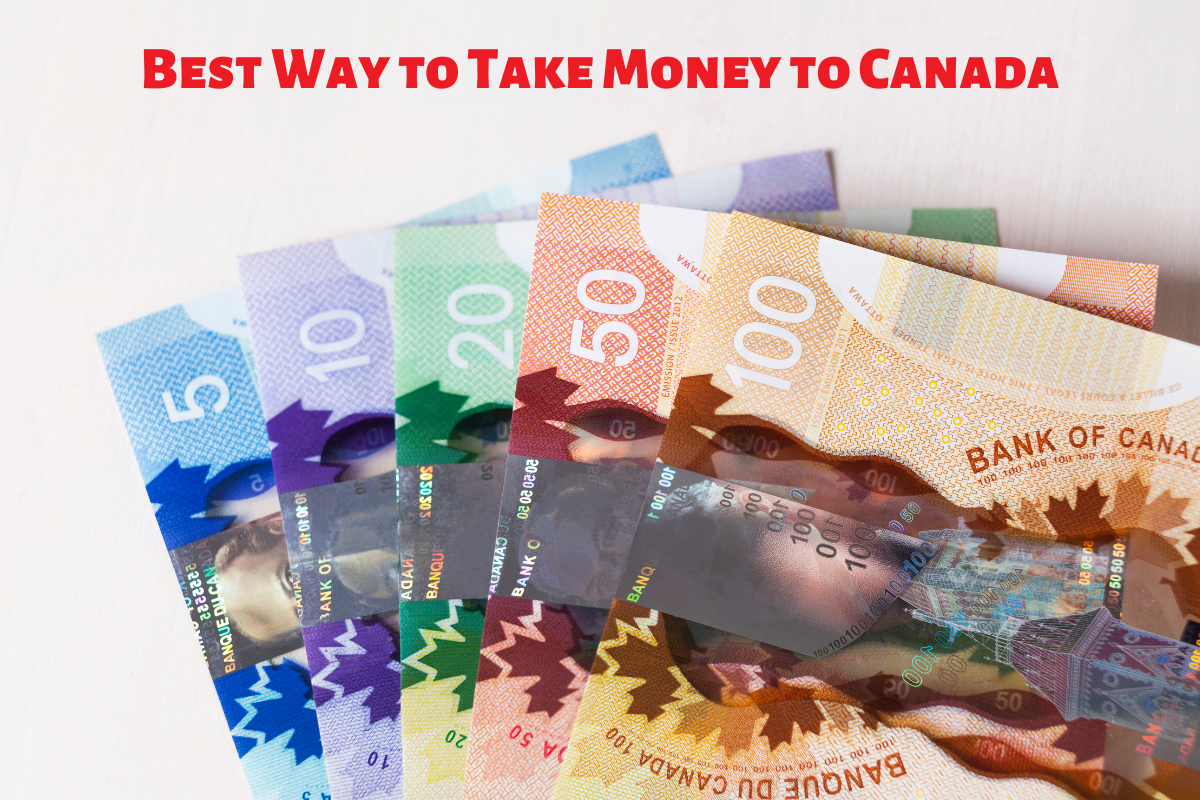What is The Best Way to Take Money to Canada?
There are several options for taking money to Canada:
- Bank transfer: You can transfer money from your bank account to a Canadian bank account, which is safe and secure.
- Debit or credit card: You can use your debit or credit card for purchases and ATM withdrawals in Canada, but be aware of potential foreign transaction fees.
- Traveler’s cheques: You can bring traveler’s cheques as a form of payment, but they may not be widely accepted in Canada and can be difficult to exchange.
- Cash: You can bring cash, but it is important to keep it secure and be mindful of the restrictions on the amount of cash you can bring into the country.
Ultimately, the best option will depend on your specific needs and preferences. It’s a good idea to research and compare different options in advance to determine what works best for you.
How can I avoid currency conversion fees in Canada?
To avoid currency conversion fees in Canada, you can:
- Use a credit card with no foreign transaction fee: Some credit cards don’t charge a fee for foreign transactions, so consider using one of these cards when traveling abroad or making online purchases.
- Get a borderless account: Consider opening a borderless account, such as TransferWise, which allows you to hold money in multiple currencies and convert funds between them at a much lower rate than traditional banks.
- Use local ATMs: When traveling, try to use ATMs that belong to your bank or an affiliated network, as they may not charge a fee for withdrawing cash in local currency.
- Pay in the local currency: When making purchases abroad, opt to pay in the local currency instead of your home currency, as merchants may offer a better exchange rate and avoid dynamic currency conversion fees.
- Compare exchange rates: Before making a currency exchange, compare rates offered by different banks, currency exchange services, and online platforms to find the best deal.
How do I get a higher exchange rate?
To get a higher exchange rate when converting currency, you can try the following steps:
- Compare rates from multiple sources: Compare exchange rates from banks, online currency exchange services, and other providers to find the best deal.
- Timing is important: Exchange rates can fluctuate, so consider timing your exchange to take advantage of favorable rates.
- Use a currency exchange service with low fees: Some currency exchange services charge lower fees than banks, which can result in a better exchange rate.
- Avoid exchanging currency at the airport: Currency exchange rates at airports are often less favorable due to the convenience factor.
- Consider using a multi-currency account: Some borderless accounts, like TransferWise, offer competitive exchange rates and allow you to hold and convert between multiple currencies.
- Negotiate the rate: If you’re making a large currency transfer, try negotiating the exchange rate with your bank or currency exchange provider.
- Buy the currency in advance: If you know you will need to exchange currency in the future, consider buying it in advance when rates are favorable.
Should I exchange money before I travel to Canada?
Whether you should exchange money before traveling to Canada depends on several factors. Here are a few things to consider:
- Exchange rates: If the exchange rate is favorable, it may make sense to exchange some money before your trip. However, it’s important to compare exchange rates from multiple sources to ensure you’re getting a good deal.
- Convenience: Exchanging money before your trip can be convenient, as it means you won’t have to worry about finding a currency exchange when you arrive.
- Fees: Some currency exchange services charge fees for exchanging money, so consider this when making your decision.
- Credit card usage: If you plan on using a credit card during your trip, it may not be necessary to exchange money in advance. Many Canadian merchants accept international credit cards and some credit cards do not charge a foreign transaction fee.
Ultimately, the decision of whether to exchange money before traveling to Canada will depend on your individual needs and preferences. It may be a good idea to exchange a small amount of money for emergency purposes, but relying on a credit card for most transactions can help you save on fees and potentially get a better exchange rate.
Where can I get the best exchange rate in Canada?
The best exchange rate in Canada will vary depending on market conditions and the provider you use. Here are a few options to consider:
- Banks: Major Canadian banks, such as Royal Bank of Canada (RBC), Bank of Montreal (BMO), and Canadian Imperial Bank of Commerce (CIBC), offer currency exchange services. However, they may not always have the best exchange rates, and they may charge fees for the service.
- Online currency exchange services: Online platforms, such as Knightsbridge FX and XE Money Transfer, can offer competitive exchange rates and may have lower fees than banks.
- Currency exchange kiosks: Currency exchange kiosks, also known as bureau de change, can be found in airports and tourist areas. They may offer competitive exchange rates, but it’s important to compare rates from multiple providers and be aware of any fees they may charge.
- Credit cards: Some credit cards offer favorable exchange rates when used abroad. Consider using a credit card with no foreign transaction fees to save on costs.
It’s recommended to compare exchange rates from multiple providers before making a currency exchange to ensure you’re getting the best deal. Keep in mind that exchange rates can fluctuate, so it’s important to monitor the market to get a good rate.
Which bank in Canada has the lowest fees?
The bank with the lowest fees in Canada may vary based on the type of fee, the amount being transferred, and the location of the bank branch. However, some banks are known for offering low or no fees for certain services.
For example:
- TD Bank: TD Bank offers a range of fee-free banking options, including no-fee debit transactions and no-fee daily banking packages.
- Scotiabank: Scotiabank offers a number of fee-free banking options, including no-fee day-to-day banking packages and free Interac e-Transfers.
- CIBC: CIBC offers a variety of fee-free banking options, including free Interac e-Transfers and no-fee chequing accounts.
- National Bank of Canada: National Bank of Canada offers a range of fee-free banking options, including free Interac e-Transfers and no-fee chequing accounts.
It’s important to note that the fees charged by banks can vary depending on the type of account, the location of the branch, and the amount being transferred. Be sure to compare the fees charged by multiple banks and carefully review the terms and conditions of any account before making a decision.
Can I carry gold in international flight to Canada?
Yes, you can carry gold in an international flight to Canada. However, there may be restrictions on the amount of gold that can be brought into the country, as well as reporting requirements.
Under Canadian law, travelers are required to declare any gold they are bringing into the country if its value exceeds CAD 10,000. The gold must be declared to the Canada Border Services Agency (CBSA) when you arrive.
It’s important to note that customs laws and regulations can change, so be sure to check with the Canadian government and your airline for the most up-to-date information before traveling. Additionally, some countries may have restrictions or additional reporting requirements for exporting gold, so it’s important to check with the relevant authorities in your departure country as well.
What happens if you declare more than $10 000 Canada?
If you declare an amount of currency (including gold) that exceeds CAD 10,000 when entering Canada, you may be subject to additional reporting requirements and examination by the Canada Border Services Agency (CBSA).
Declaring amounts in excess of CAD 10,000 does not necessarily mean that the funds are illegal or that you will be penalized. However, the CBSA may choose to examine the funds to ensure that they are legitimate and not related to illegal activities such as money laundering or terrorist financing.
If the CBSA determines that the funds are legitimate and not related to illegal activities, they will be released to you and you will be allowed to enter Canada with the funds.
However, if the CBSA determines that the funds are related to illegal activities, the funds may be seized, and you may face criminal charges or penalties.
It’s important to be transparent and honest when declaring funds to the CBSA, and to cooperate fully with any examination or investigation. If you have any concerns or questions about the declaration process, it’s best to speak with a lawyer or a professional who specializes in Canadian customs law.
How much money can a husband and wife carry on international flight legally?
There is no specific limit on the amount of money that a husband and wife can carry on an international flight. However, if the combined value of their currency and negotiable instruments (such as traveler’s cheques, money orders, and negotiable bonds) exceeds the reporting limit in their departure or destination country, they may be required to declare it to the relevant authorities.
In the United States, for example, if the combined value of currency and negotiable instruments exceeds USD 10,000, a report must be filed with U.S. Customs and Border Protection (CBP). In Canada, if the combined value exceeds CAD 10,000, a report must be filed with the Canada Border Services Agency (CBSA).
It’s important to note that declaring amounts that exceed the reporting limit does not necessarily mean that the funds are illegal or that you will face penalties. However, the relevant authorities may choose to examine the funds to ensure that they are legitimate and not related to illegal activities such as money laundering or terrorist financing.
It’s always a good idea to check with the relevant authorities in your departure and destination countries for the most up-to-date information on their currency reporting requirements.




